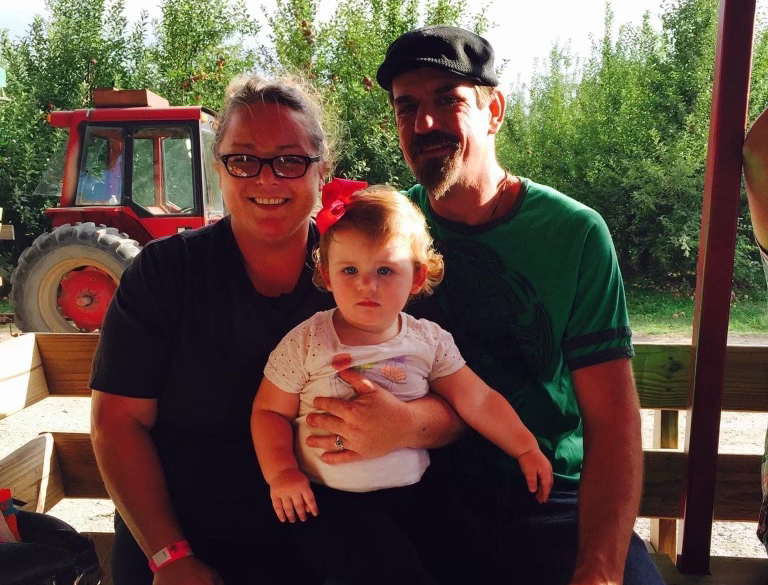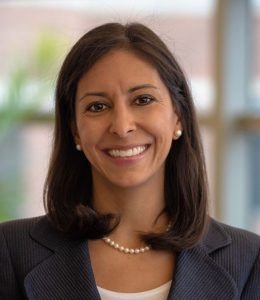While Awaiting a Vaccine and Debating Reopening, District Responses to Medical Accommodations for At-Risk Teachers Vary Wildly Across the Country
By Zoë Kirsch | January 12, 2021
Updated, Jan. 13
Longtime clerk Deanna Myron didn’t anticipate celebrating her 21st work anniversary with Curie Metropolitan High School on Chicago’s Southwest Side this way — remotely, and with an appearance on a union Zoom call talking about staff being denied medical accommodations during the pandemic.
But Myron, the daughter of a school clerk who remembers walking Curie’s halls herself as a student, felt she had little choice: her fiance has liver cancer, and her district had turned down her request for full-time remote work accommodations during COVID-19. Since getting that answer in September, Myron has used up all of her sick time and vacation days, and has been juggling spreadsheets from her home workstation five days a week while getting paid for just three days because she refuses to return to school.
“It changes you, you know,” she said of the virus, whose grip on Chicago forced an extension of the mayor’s stay-at-home order this week. “You realize what’s important to you. And what’s important to me are my family and my job.” With memories of her fiance soldiering through chemo still fresh, Myron didn’t want to take any chances, opting to stay at home with her two dogs and her 6-year-old daughter.

She is one of countless American school staffers who are either immunocompromised or living with immunocompromised family members. According to the Kaiser Family Foundation, 1.5 million teachers — or almost one in four — have medical conditions that place them at increased risk of serious illness if they get COVID-19. Many are consequently hesitant about returning to buildings amid viral spread, afraid of falling seriously ill or bringing the illness home to their relatives.While that fear is present throughout the country, how school districts have responded to medical accommodation requests has varied wildly: in New York City, which has more students than any district in the nation and one of its most powerful teachers unions, officials granted about 34,000 of the 38,000 requests to work from home, for instance. Meanwhile, in Houston, the nation’s seventh-largest district, a union attorney said officials have denied almost 100 percent of staffers’ requests.
“There are lots of teachers who are older, at risk, or have family members who are at risk, and they have asked for medical accommodations,” Randi Weingarten, president of the American Federation of Teachers, the country’s second-largest teachers union, told The 74. “They’ve asked to teach remotely, and whether or not they get the accommodation has far more to do with budget and staffing than it does with need.”
The U.S. is indeed facing a national staffing shortage in schools, an issue that’s inextricably linked to the push-pull in some districts over medical accommodations, and to the greater tension over reopening schools for in-person learning. In Chicago, where Myron works, preschoolers and special needs students returned to school Monday amid an ongoing showdown between the mayor, district leaders and the Chicago Teachers Union over whether schools could safely reopen and the imperative to bring students back into the classroom after 10 months of remote learning. The union was advising teachers who had asked for a health-related accommodation but hadn’t received a response to continue working remotely, Chalkbeat reported, while Schools Superintendent Janice Jackson said that teachers who did not receive an accommodation and resisted returning to work in-person would have access to their Google Classroom accounts blocked and their pay docked.
Some 678 teachers did not show up for work Monday at Chicago Public Schools, which, according to the union, has denied about 60 percent of accommodations sought by staff, and rejected 85 percent of requests sought by staffers whose family members are immunocompromised.
Meanwhile, two other forces are at work that could dramatically affect the equation over school reopenings: the vaccine and an ambitious plan being weighed by the incoming Biden administration to spend some $42.5 billion testing all students once a week and teachers twice a week for the remainder of the current school year. Blanket testing, which aligns with Biden’s plan to reopen the majority of schools within his first 100 days, is just beginning to take shape, however, while the vaccine rollout has been stilted.
https://twitter.com/ronniealmonte/status/1348736351873736706
In New York City, teachers union leader Michael Mulgrew announced Sunday that his members would be given priority, speeding up the shots for in-school personnel who want to be vaccinated. Schools Chancellor Richard Carranza told teachers with medical accommodations to stand by for further word on when they would be eligible.
According to data obtained by The 74 through a Freedom of Information request, approximately 34,000 requests to the New York City Department of Education for COVID-related medical accommodations have been approved across 1,578 schools. Earlier reports have put the number of teachers within that group between roughly 17,000 and 21,000 of the city’s 75,000-member teaching corps. The DOE said of the 34,334 school-based employees with accommodations, roughly 21,000 are teachers, or 27 percent of all city teachers.
Efforts to refile a legal petition brought by a group of NYC teachers whose requests were rejected rolled to a halt after, one by one, the petitioners won their accommodations through negotiations with the district, according to Lydia Howrilka, a 10th-grade teacher who was part of the complaint. Those remaining on the document are mostly middle and high school teachers, who haven’t had to enter buildings since the mayor decided to prioritize the city’s youngest students, and those with significant special needs, for in-person learning.
The data on accommodations that were granted in nearly 1,600 schools across all five boroughs show the divergent impact the coronavirus has taken on staffing. While the median number of employees working remotely across all schools was 16, there is Walter J. Damrosch, a K-8 school in the Bronx with 714 students with significant special needs and 231 adults — or 48 percent of the school’s staff — out with medical accommodations. Just under 100 schools have five or fewer employees working remotely.
“Even in New York City, there’s lots of latitude for principals,” Weingarten said. “And I understand principals’ concerns saying that they don’t have enough staff, but you’re not going to get enough staff if staff believes that they are dispensable, and that those who are at risk are not being taken care of.”
“It validates the severity of the staffing shortage NYC schools is facing,” City Councilman Mark Treyger said of the data. “Staffing issues are still very prevalent today — it’s the number one reason, in addition to the rising number of infections across the city, why many schools cannot open five days a week.”
The pandemic forcing the socially distanced distribution of students has required school leaders to hire more teachers — and to hire them at a time when they also need to spend money on mitigating viral spread in other ways: through the purchase of PPE, hygienic supplies and computers to facilitate remote learning. Notably, not all districts are even offering in-person learning: a little over half of American K-12 students are learning from home.
Two new studies on COVID-19 have revealed that opening up school buildings in communities where cases and hospitalizations are rare doesn’t speed up the spread of the virus. But doing so in places with more cases does, according to one of the studies, and it’s unclear from the other what that tipping point is.
Officials at the Austin Independent School District approved just 49 of the 1,156 medical accommodation requests they received from teachers for the spring 2021 semester, before saying they would reexamine the rejected requests. At first, the district said there would be no appeals process.
“I have no problem going back to work after a vaccine,” Austin high school teacher Annie Dragoo told station KXAN. Dragoo was denied a medical accommodation for the spring semester despite having a rare heart condition and receiving cancer treatment. “I have been trying to figure out a way for me to be distanced and still be there.”
The AFT has helped its local chapters settle disputes over medical accommodations around the country, according to Weingarten. In Fairfax County, Virginia, members pushed back against the district when officials asked them to declare their intention to return to school prior to learning whether they had received accommodations. In August, the local chapter in Cypress-Fairbanks, a suburb outside of Houston, filed a lawsuit asking a judge to intervene in school staff being forced to return to classrooms at the end of that month. The district, which the union president said has denied more than 90 percent of medical accommodation requests, is now operating with a hybrid model, and employees without accommodations are expected to be back in buildings.
Sonia Gonzalez is an attorney with the Houston Federation of Teachers who’s worked with the union for about five years. She estimates that the Houston Independent School District has rejected over 95 percent of staffers’ medical accommodation requests, a topic that now consumes half of all her phone calls.
“Whereas before it was one in 20 calls, now I see [it] coming up on our call logs all day, every day,” she said. “I can’t tell you how many teachers have high blood pressure; many are diabetic,” she added.
A Houston ISD spokesperson declined to comment. Gonzalez explained that the main law at play when a teacher disputes a medical accommodation request is the Americans with Disabilities Act, a federal civil rights law that prohibits workplace discrimination on the basis of disability. For obvious reasons, she said, the law to this point has not been used to protect the employment status of at-risk workers during a pandemic nor their vulnerable family members.

Rebecca Haffajee, a policy researcher at the RAND Corporation, says that beyond providing reasonable accommodations for staffers covered by the ADA, districts should secondarily try to accommodate those conditions that place individuals at increased risk for severe illness with COVID-19, as outlined by the Centers for Disease Control.
Still, accommodating school staff with those conditions can become logistically tricky for districts, she explained — in particular, regarding those who are or might be pregnant, given the high share of the teaching workforce that’s female and of child-bearing age.
Many teachers who get rejected are reluctant to file grievances, said Gonzalez, the Houston union lawyer, partly because the process can take up to two to three months. Some of those who have become discouraged have resigned, she said: “They’re afraid.”
That was the case for Richard Littleton, a veteran science teacher in Polk County, Florida, who quit after his medical accommodation request was denied by the district. At the time, Littleton’s wife was pregnant.
“Over the last five years, I have sacrificed a lot for my students and education in Polk County,” he told The Lakeland Ledger. “But I’m not willing to sacrifice my wife or our first child for Polk County Schools.”
Dr. Katrina Harley, a teacher at Miramar High School, part of the Broward County Public School system in Florida, has been facing a similar predicament. The single mother of three has a daughter with multiple sclerosis, and after her medical accommodation request was denied, she started to consider retiring. Just 842 of the 5,000 teachers who have applied for remote work accommodations in Broward County, America’s sixth-largest district, were approved, NBC Miami reported in November.
District officials wrote in an email this week that they have granted over 2,000 remote work assignments to employees since October — more than any other district in South Florida, they said. Currently, “remote work assignments continue to be granted for more than 600 employees,” the district said.
Haffajee, the public health researcher, says she’s heard about districts being forced to make difficult decisions, like choosing whom to grant medical accommodations based on who filed first or who’s at greater risk.
Moving forward, districts making these tricky determinations should keep an eye on local positivity rates, on scientific updates about the means of transmission, and on the new variant that’s emerged overseas and, more recently, in some American communities, she said.
She’s in favor of staff reapplying for medical accommodations each semester — as has been required in Houston and Chicago — given how quickly what we know about the virus is changing. New York City said it would require staffers to reapply, but then dropped any review process, automatically extending the 34,000 existing accommodations for the rest of the school year with little fanfare in December.
Haffajee will also be looking to the Biden administration for new, coordinated guidance from the federal Education Department and the CDC on in-person learning during the pandemic.
“That’s really what we need is much clearer federal guidance on all of this from the DOE and the CDC,” she said. “I know Biden is intent on ramping up that area and having clear recommendations for schools as to what they should be doing. As it is, it’s basically been left entirely to localities, and a little bit to states.”
Ultimately, districts will have to reckon with the issue of medical accommodations, she added. Certain populations, including pregnant women, haven’t specifically been cleared for the vaccine yet. For them, the question of medical accommodations will still be on the table.
For many, not showing up in school buildings — whether as a result of quitting, as in Littleton’s case, or as a result of working remotely, as in Myron’s — hasn’t been easy.
“They were my kids before I had a kid,” Myron said. “I miss being in school with my students.”
Lead Image: Chicago Teachers Union advised teachers who had requested medical accommodations but not heard back to continue working remotely when schools reopened this week. In December, teachers and supporters participated in a car caravan to demand a safe and equitable return to in-person learning during the COVID-19 pandemic. (Getty Images)
Get stories like these delivered straight to your inbox. Sign up for The 74 Newsletter

